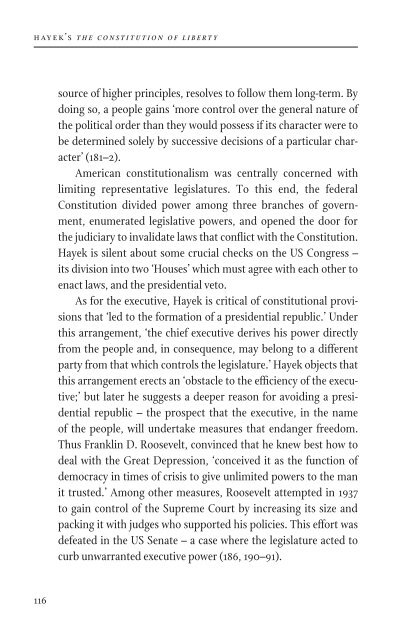Hayek's The Constitution of Liberty - Institute of Economic Affairs
Hayek's The Constitution of Liberty - Institute of Economic Affairs
Hayek's The Constitution of Liberty - Institute of Economic Affairs
Create successful ePaper yourself
Turn your PDF publications into a flip-book with our unique Google optimized e-Paper software.
h ay e k ’ s t h e c o n s t i t u t i o n o f l i b e r t y<br />
o r i g i n s a n d d e v e l o p m e n t o f t h e r u l e o f l aw<br />
source <strong>of</strong> higher principles, resolves to follow them long-term. By<br />
doing so, a people gains ‘more control over the general nature <strong>of</strong><br />
the political order than they would possess if its character were to<br />
be determined solely by successive decisions <strong>of</strong> a particular character’<br />
(181–2).<br />
American constitutionalism was centrally concerned with<br />
limiting representative legislatures. To this end, the federal<br />
<strong>Constitution</strong> divided power among three branches <strong>of</strong> government,<br />
enumerated legislative powers, and opened the door for<br />
the judiciary to invalidate laws that conflict with the <strong>Constitution</strong>.<br />
Hayek is silent about some crucial checks on the US Congress –<br />
its division into two ‘Houses’ which must agree with each other to<br />
enact laws, and the presidential veto.<br />
As for the executive, Hayek is critical <strong>of</strong> constitutional provisions<br />
that ‘led to the formation <strong>of</strong> a presidential republic.’ Under<br />
this arrangement, ‘the chief executive derives his power directly<br />
from the people and, in consequence, may belong to a different<br />
party from that which controls the legislature.’ Hayek objects that<br />
this arrangement erects an ‘obstacle to the efficiency <strong>of</strong> the executive;’<br />
but later he suggests a deeper reason for avoiding a presidential<br />
republic – the prospect that the executive, in the name<br />
<strong>of</strong> the people, will undertake measures that endanger freedom.<br />
Thus Franklin D. Roosevelt, convinced that he knew best how to<br />
deal with the Great Depression, ‘conceived it as the function <strong>of</strong><br />
democracy in times <strong>of</strong> crisis to give unlimited powers to the man<br />
it trusted.’ Among other measures, Roosevelt attempted in 1937<br />
to gain control <strong>of</strong> the Supreme Court by increasing its size and<br />
packing it with judges who supported his policies. This effort was<br />
defeated in the US Senate – a case where the legislature acted to<br />
curb unwarranted executive power (186, 190–91).<br />
<strong>The</strong> issue <strong>of</strong> majority rule is central to Hayek’s discussion <strong>of</strong><br />
American constitutionalism. Mainly he relies on a distinction that<br />
the American founders had employed, one between the majority’s<br />
<strong>of</strong>ten ill-considered short-term will and its more deliberate longterm<br />
will. <strong>The</strong> <strong>Constitution</strong>’s democratically minded critics fault<br />
it for structuring government so as to thwart the majority will.<br />
Hayek replies that ‘a constitutional system does not involve an<br />
absolute limitation <strong>of</strong> the will <strong>of</strong> the people but merely a subordination<br />
<strong>of</strong> immediate objectives to long-term ones.’ Thus the people<br />
agree ‘to submit to the will <strong>of</strong> the temporary majority on particular<br />
issues’ on ‘the understanding that this majority will abide by more<br />
general principles laid down beforehand by a more comprehensive<br />
body,’ such as a constitutional convention (179–80).<br />
Culmination in Germany<br />
Each <strong>of</strong> the nations that contributed to the growth <strong>of</strong> the Rule<br />
<strong>of</strong> Law responded to a particular threat to individual freedom:<br />
England to arbitrary monarchical power; America to representative<br />
legislatures and majorities fixed on short-term goals; and<br />
Germany to the administrative state.<br />
<strong>The</strong> ‘German people’ had a complex political history during<br />
the period <strong>of</strong> Hayek’s review, and it is sometimes difficult to tell<br />
just which phase <strong>of</strong> that history or which German states he has in<br />
mind. <strong>The</strong> German Confederation was formed in 1815, following<br />
the defeats <strong>of</strong> Napoleon. It was comprised <strong>of</strong> 39 states, with<br />
Prussia and Austria being the dominant members. In 1866, with<br />
the victory <strong>of</strong> Prussia and its German allies in the Austro-Prussian<br />
War, the German Confederation was dissolved; and that year the<br />
North German Confederation was established by Prussia and<br />
116<br />
117












